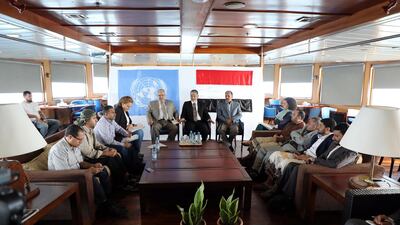Yemen's warring sides met on Thursday for the second day aboard a UN-flagged vessel to discuss the execution of the Hodeidah agreement.
The UN is trying to implement a truce and troop withdrawal accord, reached last year between Yemen's internationally recognised government and Houthi rebels, in Hodeidah, the main entry point for most of Yemen’s imports, as part of efforts to end the war.
It was agreed that international monitors would be sent to oversee the withdrawal of troops from both sides in the city.
But the deal was never fully implemented, partially because the pact did not make clear who would control Hodeidah after the withdrawal of the rebels in early January.
Meetings of the Redeployment Committee, led by retired general Abhijit Guha, are crucial to building on the agreement.
They are held regularly to supervise the implementation of the ceasefire.
Mr Guha "will facilitate discussions on the implementation of the Hodeidah Agreement and further steps to enhance the ceasefire in Hodeidah", the UN said.
"The meeting will also discuss improving humanitarian access throughout the governorate."
The meeting began on Wednesday and was expected to conclude on Thursday.
During Wednesday's meeting, the head of the government delegation urged Mr Guha to visit the port city to investigate breaches committed by the rebels, said Col Wathah Al Dubaish, spokesman for the Joint Forces in Hodeidah.
The UN announced in October that four joint observation posts manned by troops loyal to Yemen's government and Houthi rebels had been set up in the port city.
The truce agreed to in December has stumbled because of Houthi breaches and the lack of agreement on how both sides withdraw their forces from in and around Hodeidah.
It comes as hundreds of displaced civilians from Hodeidah held a protest outside the UN headquarters in the southern city of Aden.
“One year passed and nothing has been achieved," a protester said. "Houthi forces are still in the ports, detainees held in Houthi detention are being killed and the rebels are continuing to plant their mines all around Hodeidah."
Last week, international aid groups warned that the city remains the most dangerous place in Yemen. They said that since December last year, 799 civilians have been killed and wounded in the port city and surrounding province.
Yemen’s conflict began in 2014 when Iran-backed Houthi rebels overran the capital Sanaa and much of the north.
They pushed out Yemen’s internationally recognised government, sparking a civil war that has killed tens of thousands of people.
A Saudi Arabia-led coalition intervened in 2015 against the Houthis to restore the government of President Abdrabu Mansur Hadi to power.

